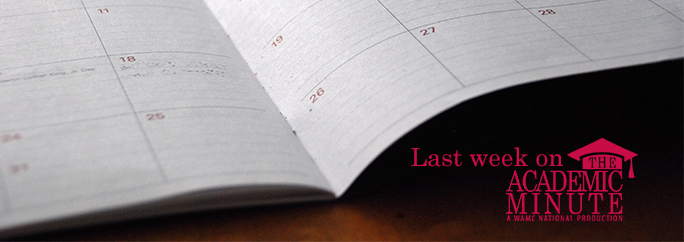
The Academic Minute from 07.25 – 07.29
Monday, July 25th
Joe Laycock – Texas State University
Why Exorcism Won’t Go Away
Joseph P. Laycock is the author of several books on religious history including The Penguin Book of Exorcisms.
Tuesday, July 26th
Evan Larson – University of Wisconsin Platteville
Bringing People into the Wilderness
Evan Larson (he/him/his) is a Professor of Environmental Sciences & Society at the University of Wisconsin-Platteville, a primarily undergraduate institution in the beautiful rolling hills of the Driftless Area. His expertise in dendrochronology, the science of tree rings, and biogeography, the study of patterns in the distribution of life on Earth and the processes that shape them, enable him to combine scholarship, a love of teaching, and an enthusiasm for working outside into classes and research that blur the boundaries between the physical and social sciences. He is fortunate to work with amazing colleagues who together are re-storying the relationships among people, fire, and pine in the Great Lakes Region.
Wednesday, July 27th
Amity Noltemeyer – Miami University
Student and Staff Wellness Needs in the Pandemic Context
Dr. Amity Noltemeyer is a Professor of School Psychology and Associate Dean of the Graduate School at Miami University. She serves as one of six-co leads on the Ohio School Wellness Initiative (OSWI). Dr. Noltemeyer also has previous experience as a department chair, President of the Ohio School Psychologists Association, Editor-in-Chief of School Psychology International journal, and a practicing school psychologist.
Thursday, July 28th
Tallie Z. Baram – University of California, Irvine
Early Adversity and Brain Development
Prof. Tallie Z. Baram is the Danette Shepard Professor of Neurological Sciences, with appointments in several departments at UCI. Baram is a developmental neuroscientist and child neurologist and has focused her efforts on the influence of early-life experiences on the developing brain, and on the underlying mechanisms. She is studying this broad topic in two contexts: a) How early-life experiences, including adversity/stress, influence resilience and vulnerability to cognitive and emotional disorders; and b) how early-life seizures, especially those associated with fever, can convert a normal brain into an epileptic one, with associated memory problems.
Baram has strong track-records in the use of cutting-edge molecular, epigenetic, and MR imaging methods to uncover how adverse early-life experiences sculpt circuit maturation in the developing brain, focusing on memory-, stress- and reward-related networks. Baram and her work have been internationally recognized, as is apparent from awards including the NIH NINDS Javits Merit Award and the premier Research Awards of the AES (2005), CNS (2013), ANA (2014) and AAN (2018). Baram continually strives to contribute to the scientific community by, for example, chairing NIH study sections and involvement in editorial boards and professional organizations. Baram has a passion and commitment to mentoring: She is the Principal Investigators of one of only two NIH-funded T32s focused on Epilepsy, and mentor of several recently funded NIH K awardees. Baram’s prior trainees from diverse countries and backgrounds are now contributing independently to basic, translational and clinical neuroscience.
Friday, July 29th
Mary Koss – University or Arizona
Alcohol and Sexual Assault on College Campuses
Sexual assault scholar, APA award winner for empirical contributions to public policy (2000) and international advancement of psychology (2017). Did first national survey of sexual violence victimization and perpetration in 1987, to which the term “date rape” is credited. Designed and implemented the first restorative justice program for adult sex crimes called RESTORE. Challenged serial rape in 2015 JAMA-Pediatrics. Promoted victim voice in 2017, American Psychologist. Grantee, NIAAA. Featured on This American Life.
